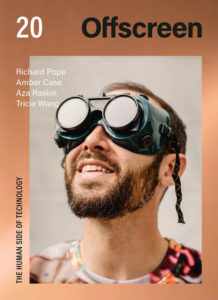Highlights & Annotations
“People who have experienced only optimal conditions shouldn't be making all of the technology decisions“ – Amber Case (54)
Lina Patel (63)
- Be power literate
- Power permeates everything we do. Anyone who is driven to make a difference and create change uses power to achieve their ambitions. The onus is on me to develop immunity to power’s potential to corrupt, and to keep myself in check by learning how power operates. Being power-literate means being able to see it, understand it, and use it wisely.
- Empowered people empower people
- When I lead people, I can multiply the effects I have on the world around me. The more freedom I can give people around me by increasing the range of choices, the more freedom those people can go on to give others. Don't be the one to cause unnecessary suffering for your colleagues, clients, and communities: choose to empower others.
- Nothing for us without us
- Working in technology puts me in a privileged place in society. When designing and creating solutions for people who have had a completely different life than mine, I seek to involve them, or I risk further marginalizing them through my assumptions. My best intentions will never be as good as genuinely involving people from the community I'm creating for.
- Observe, observe, observe.
- Observation is one of my minor superpowers. The more I observe, the more I notice. The more I notice, the more insightful and relevant my actions become, and the more influence I have. Observing means remaining curious about the world around me – it's about being alive to the moments that make up my life.
- Ask, never assume.
- Observing is me soaking in the world. Asking is me waiting out to understand people's experience of the same world. I asked with a sense of curiosity, instead of assuming that I know it all. This also means I make the implicit explicit, which people will love you for.
- Know how much is enough.
- Four years ago I learned about voluntary simplicity. I worked out how much money I needed to be content and to provide for my family. Once I learned my ‘enough’ amount, I am free to choose how I spend my time and I am not bound to working for money. It means I don't eat up the world faster than it can replenish.
- What if I have one year left?
- I have a memento mori a – mindful meditation on mortality – which I used to remind myself of the inevitability of death. Before making important decisions, I ask myself, ‘If I were to die in one year's time, what would I choose?’ For me, one year is long enough to make a difference and it's short enough for clarity.
“Executives can be sent off for training at a ‘curiosity workshop’, but if they come back into a company that doesn't encourage or understand the value of curiosity, it's almost like organ rejection. If the underlying structure of the company doesn't support thinking about things like how creativity, community, and collaboration works, there's no incentive to exercise the curiosity they've learned.” (131) Tricia Wang
- // not just curiosity, your company can send you to any type of workshop (ie. diversity) and if there’s systematic issues that prevent diversity to thrive, then it just won’t take hold
- Organ rejection is a concept that comes up; a singular thing being rejected by a system
“...you have to ask people to tell you things don't want to hear. That's when you know that you're actually in a place where you can handle and welcome massively mind-blowing insights. If you're not willing to see beyond the horizon, then you may not be open to potentially scary but actionable insights. Another important thing is to create opportunities for two different systems or ways of thinking to come together. It's when you're open to the tension of negotiating the differences and the commonalities in those two systems that you see new ideas and innovations come through.” (136) Tricia Wang
“It's easy to be cynical, so do the hard work of being hopeful and positive. I was once on a stressful gig where everything was going wrong, and for a cheap laugh, team members started scribbling nihilistic quips and drawings on the whiteboard. One evening, our project lead suddenly erased the whole thing. We all started making an effort to avoid to despair, and that more or less saved the project.” Ramsey Nasser (146)
“The ability to solve problems creatively and recognize patterns is a much more important skill than memorizing the specifics of any particular tool.” Ramsey Nasser (146)
